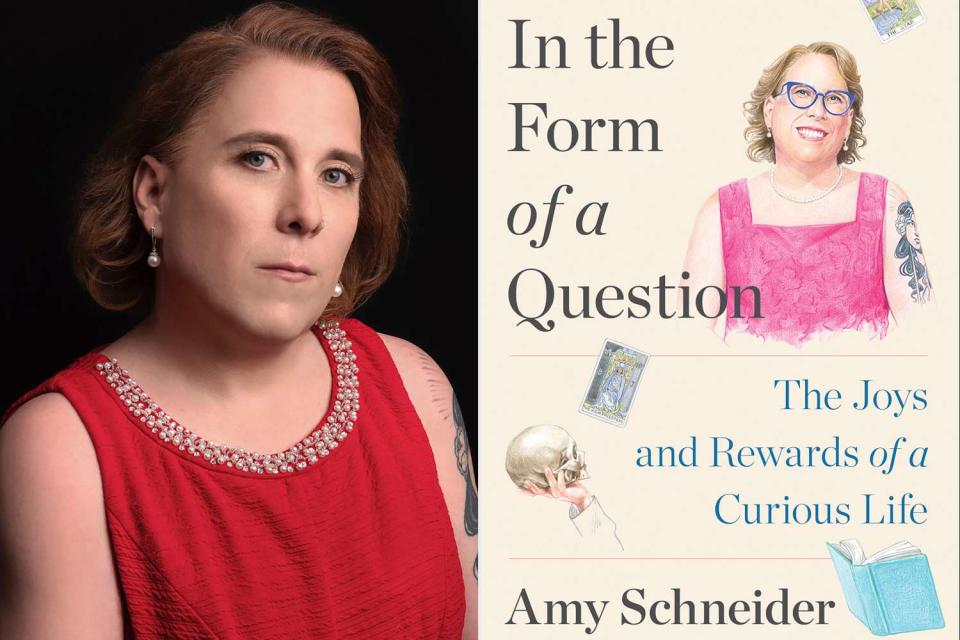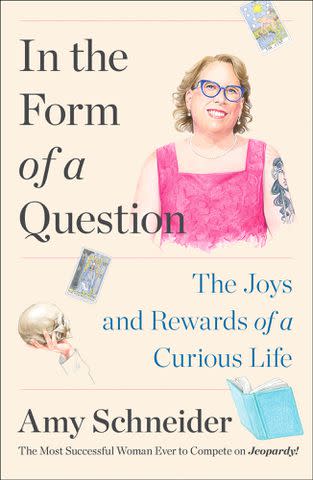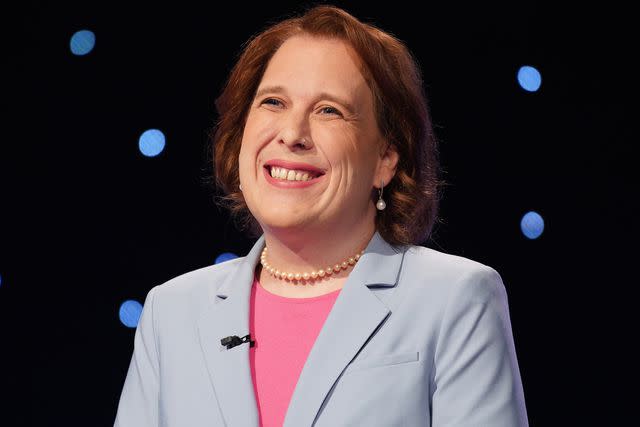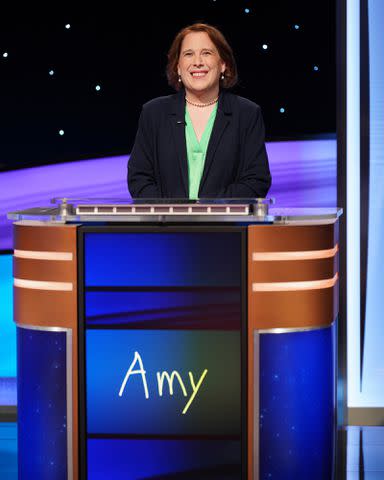Amy Schneider Talks Life Beyond “Jeopardy!” in New Memoir: 'I'm Not Comfortable Keeping Things Secret' (Exclusive)
Schneider discusses tarot, polyamory and the importance of learning in her book 'In the Form of a Question'

Sean Black
Amy Schneider has quite a story to tell.
In 2021, the Oakland-based software engineer found herself in the public eye after a momentous reign on Jeopardy! By the end of her 40-day run, Schneider, 44, who has since become the most successful female contestant on the game show, left hre 9–5 routine after amassing more than $1 million in winnings. Aside from cementing herself as a fan favorite, Schneider has also become a visible figure within the transgender community; she visited the White House to mark Transgender Day of Visibility and testified against anti-trans legislation in Ohio, where she was raised.
For Schneider, however, the person that viewers saw on their televisions every night was only a small part of the picture. In her new memoir, In the Form of a Question, out now from Avid Reader Press, the writer details her life beyond the screen — from her religious upbringing with an alcoholic parent, to her previous time in a polyamorous marriage. She shares stories of her various experiences with drugs, and the moments she first began to question her gender identity.

Written with wit and transparency, as well as the occasional passionate chapter on pop culture gems like the '90s MTV staple Daria, In the Form of a Question is both a multi-faceted portrait and an ode to learning. Read PEOPLE’s conversation with Schneider below.
You’ve said you wanted this book to show the “messiness” in your life. How so?
I think that I've always been somebody that tries to err on the side of transparency. It's just easier that way. I'm not comfortable keeping things secret. In terms of that messiness thing, that's something that came about as the writing was going on. I thought about [how] I've been talking about myself so much within this particular set of parameters. A lot of the stuff I didn’t talk about [before was] because it wasn’t family-friendly. [So I wrote about] the stuff I find interesting. I don't want to give people a false idea about who I am and what I represent.
What surprised you about the writing process?
It's hard. I've never written anything that I seriously thought would be published, at least in any mass market way. When I wrote the pitch for the book, it went fast. I just thought that writing the book would be the same way. And then, as soon as the deal was signed, and I was writing the actual book, it was like, "Oh, wow, this is an entirely different feeling, that everything I'm writing is going to be printed onto paper and sent out all over the country.” That's a different pressure.
You include footnotes in the book that serve as another source of dialogue between you and the reader. They’re especially effective in a chapter where you talk about your ADD diagnosis as an adult. Can you talk more about that experience?
It really was just an incredibly empowering diagnosis to get, because it allowed me to reframe so many of the things that I would get down on myself about. [I saw] them not as moral failings, but just as my brain works in a certain way, and I'm able to do certain things, and other things are going to come harder for me. I don’t get down on myself because I can't reach things on a shelf that I could if I was taller. In the same way, I don't need to get down on myself about the fact that I struggle not to fidget, and I struggle to pay attention in a work meeting.

Christopher Willard/ABC via Getty
Amy SchneiderYou also write in the book that you got into tarot, originally, as a way to meet women.
I did say to meet women. [It was also] a new thing to learn to develop my ability to tell stories on the spot. I didn’t expect to find that it would actually be useful in a practical sense. I don’t believe in magic per se, and I didn’t think that there was anything to it in that sense. [But] there have been times and moments in my life when it’s actually helped me reach a decision that I was struggling to make. It’s made me think about what I believe and where the limits of my atheism run up against the limits of human knowledge and the limits of knowledge about [ourselves].
Does tarot provide a different way of looking at a belief system than your previous experience with religion?
While I've been an atheist for a long time, and remained that way, that still has limits. There’s just things that are impossible to know permanently. That’s something that I struggled with in my more dogmatic, computer programmer atheist days: that science itself can prove its own limits, and that it’s just a human endeavor like anything else. It doesn't provide ultimate answers in terms of the purpose of life. Tarot has been a way for me to think about things. I do have a spiritual side and that is important and nourishing to me, even if it doesn't involve anything that I can think of as a God or a supernatural personhood.
Related: 'Jeopardy!' Champ Amy Schneider Would 'Certainly Consider' Hosting the Show After Winning Streak
You watched Jeopardy! growing up. What surprised you most about being a contestant?
I was better than I thought I was. I think that most contestants find out when they get on there that they've been overestimating. You watch at home and you remember all the ones that you miss, and you also assume that every time any of the contestants gets it right, all three of them probably knew. You overestimate how well the people on TV are doing. The other thing [is] it just is so fast. If you get into your head for 60 seconds, it could be over. There could be thousands of dollars that have changed hands in those few seconds when you were not fully focused.

Christopher Willard/ABC via Getty
Amy Schneider on 'Jeopardy!'You write about how you were afraid of how people would react to your voice. Could you talk more about that experience?
I think every trans person has the things about their gender presentation that they're most sensitive about. For me, [it was] my hairline, but I got that surgically filled in. After that, it was my voice, because going on hormones doesn't do anything about your voice if you've been through puberty. On the phone, I get “sir” a lot, and it is a little jolt every time it happens.
It's the thing I liked least about myself. I didn't want it to be on national television, but at the same time ... it is who I am. It is what my voice sounds like. So I just had to accept that it was going to be up there and I wasn't going to like it. Watching the first two episodes on TV, I hated it. But it was throwing me in the deep end because I was on TV for 40 nights in a row and then doing interviews, and it just got to the point where it was like, “I can't care about this anymore. It doesn't seem to be bothering anyone else, so I'm just going to stop letting it bother me.”
Related: Amy Schneider on Representing Her Community, Making Parents 'Feel Better' About Loved Ones' Futures
You also touch upon how your view on what it means to be trans has changed over the years. How so?
I think what's changed is not so much my view of being trans, because that changed when I became trans, but being on TV has changed my view of what is motivating the people who are resistant to trans people in society and resistant to our equality. Going back and thinking about the people I grew up with, [I realized] that very few were motivated by those really hateful points of view. It was just what they'd been raised to believe and nothing had caused them to question it, because that's just human nature. It taught me that a large percentage of the people that are afraid of trans people just don't know any.
What do you hope that your readers will take away from the book?
People you see on TV, you're only seeing a little slice of them. The other thing is how valuable it is to learn, obviously in the Jeopardy! sense, but just in the broader sense. How important it is to be willing to reconsider things and to be willing to be wrong, and to, as you learn, be open to the fact that you might learn things that make you question yourself, and that that's OK.
This interview has been condensed and edited for clarity.
For more People news, make sure to sign up for our newsletter!
Read the original article on People.


